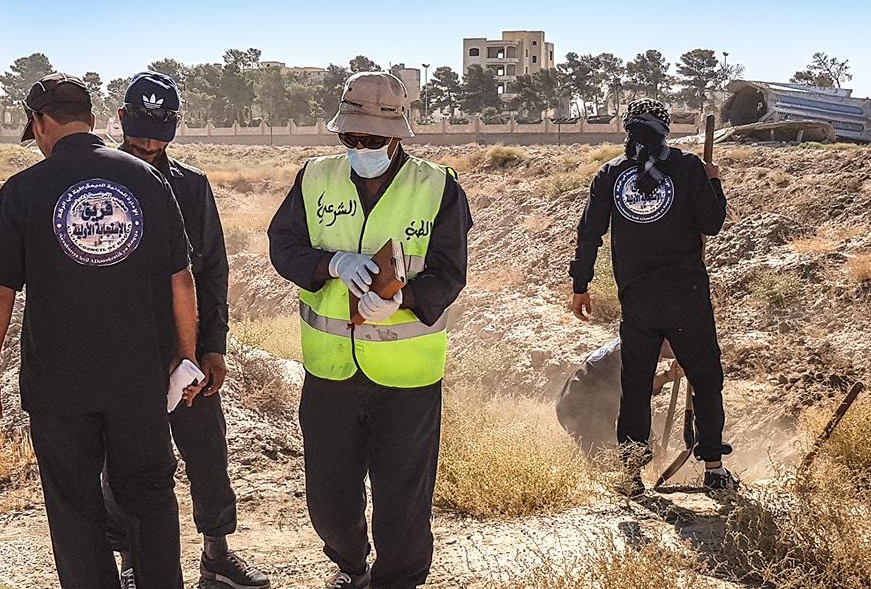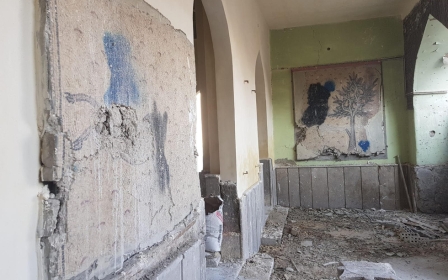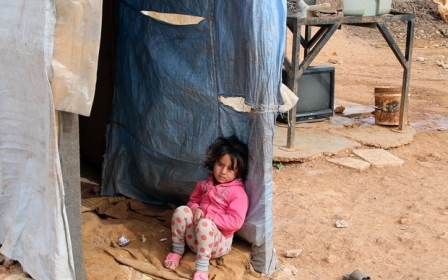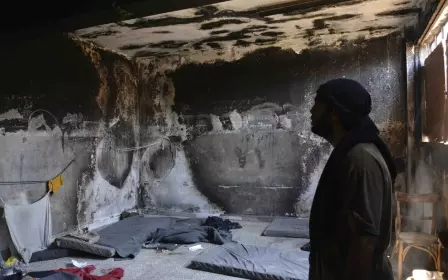Raqqa not able to identify dead as cuts slow recovery

AMMAN - A grim smell hangs in the air around the battered streets of northeastern Syria’s Raqqa.
“You’d think it was an animal carcass,” says one Raqqa resident, Hassan al-Mashadani.
And yet that smell usually means there is a mass grave nearby, he adds.
Nearly a year after the US-led international coalition ousted the Islamic State (IS) from Raqqa after a months-long aerial and ground offensive, countless bodies still remain unidentified in shallow mass graves dotted across the city and outlying countryside, leaving residents with no knowledge of the fate of their loved ones and misgivings about the prospects for Raqqa’s post-conflict recovery.
The city’s post-IS local authorities are, however, starting to act. Made up of 20 to 30 people, Raqqa civil council’s first responders team has been tasked with uncovering mass graves, and extracting and identifying the bodies of the deceased, before re-burying them in the cemetery in the Tal al-Biiah area that lies approximately three kilometres east of Raqqa city.
With only modest equipment and minimal expertise, the group has to identify the dead before the decay of their bodies makes it impossible to tell one from the other.
“Our tools are simple,” says Yasser al-Khamis, who leads the team, explaining that identification is based on assessing visible characteristics, including hair colour, clothing or personal items found on the body.
“There’s a file for each body with a name - if there is one - or a number if the name is unknown,” Khamis adds.
According to Sara Kayyali, a Syria researcher with Human Rights Watch (HRW) who has documented recovery efforts in Raqqa, local authorities in the city neither have the equipment nor the technical expertise to carry out DNA tests of the bodies. Her research in Raqqa earlier this year found that Khamis’s team - contrary to international forensic standards- does not take any photos of the bodies or maintain a digital database of its files.
The first responders team only has one doctor who works in the role of a forensics expert, but as a general practitioner they have no previous experience in forensics analysis.
“As far as we know, no international organisation has provided any kind of training or guidance, beyond sharing flyers and having conversations on the phone,” says Kayyali.
The first responders team, part of the Raqqa civil council established by the US-backed Syrian Democratic Forces (SDF) last year to govern the city after IS's defeat, was originally funded by the US as part of its stabilisation and recovery plan. But it has been badly affected by the US State Department’s decision in March to freeze all funds. On 17 August, it announced it would terminate the funds completely.
“The needs are so urgent, but the humanitarian response to those needs is lagging behind,” Kayyali adds, suggesting this leaves local groups “between a rock and a hard place”.
According to Khamis, so far the first responders team has uncovered 10 mass graves, in addition to a number of smaller burial sites, containing bodies of civilians either executed by IS or killed in bombardments by US-led forces. The exact number of bodies retrieved by the team remains unknown, but several news outlets reported in July that more than 1,200 bodies had been retrieved since the beginning of the year.
However, with the lack of resources, things are progressing slowly, and thousands of bodies are still thought to remain buried in mass graves and under the rubble of demolished buildings. So residents continue to live with the stench as well as health risks - including leishmaniasis, an infectious disease - posed by the graves.
“You are surrounded by death,” says local resident Hassan Mashadani. “You often think [to yourself] ‘Maybe we’re standing on a dead body.’”
Even so, he says, “what scares me the most is that we have grown used to these things”.
War crimes evidence lost
As Raqqa recovers from years of brutal IS rule, the inability to identify bodies accurately could have long-lasting consequences for the city’s future.
“Much of the evidence for... human rights violations or war crimes is actually in the bodies in the mass graves,” Kayyali explains.
When IS captured the province in 2014, and declared Raqqa the capital of their so-called “caliphate”, the group imposed hardline Islamist rule and meted out brutal punishments for people seen to deviate from its ideology.
During its rule, IS transformed the city’s a-Rashid stadium into one of the central prisons in the region, where it reportedly held people captive and tortured them for even minor offences. The first of the 10 mass graves to be uncovered by the first responders team was found at the stadium.
But the campaign to retake the city also came at a huge cost for civilians. The US-led aerial and ground offensive that ultimately routed IS from Raqqa last October has also been fiercely criticised by human rights groups for inflicting unimaginable destruction on the city and not taking sufficient precautions to protect civilian lives under bombardment.
There are no exact numbers of civilian deaths - however, some human rights groups and conflict monitors estimate between 6,375 and 9,790 were killed during the offensive to retake Raqqa.
“In order to understand what violations were committed in the context of the battle and even beforehand, that would require digging up these mass graves and identifying the bodies in a way that is accurate and just,” says Kayyali.
Moving on
In addition to broader concerns about human rights, the inability to identify Raqqa’s bodies has had palpable legal ramifications for the families of the victims. Obtaining an official death certificate is usually necessary to establish property ownership or inheritance rights.
“As long as a person is missing, disappeared or kidnapped, there's very little that you can actually do with their property... or inheritance,” Kayyali explains.
For residents, proving the deaths of their loved ones is crucial for the return of ordinary civilian life in Raqqa. However, the alternative is never knowing what happened to friends, family members and neighbours.
According to Mashadani, whenever a new grave is discovered, residents flock to the site for answers, fearing they might find someone they know among the dug-up remains.
“They have no way of knowing the fates of their loved ones is until those bodies are identified,” Kayyali says.
As Raqqa slowly recovers from the destruction of the bombs and the trauma left behind by IS rule, the presence of decaying bodies in Raqqa not only affects local infrastructure but also has a significant impact on the “psyche of the city”, says Kayyali.
“For these families to be able to move on and for the city to be able to move on, these bodies have to be uncovered and identified.”
This report is part of Syria’s month-long coverage on former Islamic State-held territories, in partnership with the Konrad Adenauer Foundation and reporters on the ground in Syria. Read our primer here.
Read the original article on Syria Direct. Follow Syria Direct on Twitter.
New MEE newsletter: Jerusalem Dispatch
Sign up to get the latest insights and analysis on Israel-Palestine, alongside Turkey Unpacked and other MEE newsletters
Middle East Eye delivers independent and unrivalled coverage and analysis of the Middle East, North Africa and beyond. To learn more about republishing this content and the associated fees, please fill out this form. More about MEE can be found here.





